|
|
|
Sort Order |
|
|
|
Items / Page
|
|
|
|
|
|
|
| Srl | Item |
| 1 |
ID:
153546
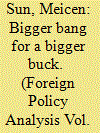

|
|
|
|
|
| Summary/Abstract |
While China used to condemn UN peacekeeping as a Western tool in the 1970s, it now supplies the largest number of UN peacekeeping troops among the UN Security Council Permanent Five. To explain this puzzling change in China’s attitude toward UN peacekeeping, this paper constructs an original framework that unpacks China’s evolution in self-identity as a “responsible major power” by first disaggregating the economic, military, and political costs and benefits for its participation in UN peacekeeping. In so doing, this paper shows that China’s attitudinal change is best captured by a shift from a present-cost-driven, “purchase” model of participation in international institutions to a future-benefit-driven, “investment” model of participation. A series of key events that occurred between the mid-1990s and the early 2000s, notably China’s accession to the WTO and its successful bid to host the 2008 Olympic Games, had in part accustomed China to paying large institutional costs upfront in order to be “part of the club.” The paper concludes with a brief discussion on the applicability, or the lack thereof, of the Chinese experience to other countries’ experiences with international institutions given China’s unique historical trajectory and cultural idiosyncrasies.
|
|
|
|
|
|
|
|
|
|
|
|
|
|
|
|
| 2 |
ID:
153544
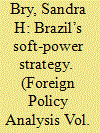

|
|
|
|
|
| Summary/Abstract |
By trading upon the principles of South-South cooperation, Brazil is widely viewed as having gained a positive image worldwide. Brazil’s South-South development cooperation was one of the foreign policy instruments it used to raise this profile. However, studies of the generation of soft power are still lacking in the international relations literature, and where empirical research exists it focuses more on the results of soft power strategies than on how soft power is created. Therefore, this article explores how Brazil’s soft power strategy is conceptualized in Brazil’s development cooperation discourse and how it is operationalized through South-South development activities. This research uses a triangulation method combining the analysis of official documents, academic studies and interviews to conclude that the Brazilian government under President Lula (2003-2011) influenced the organization of its cooperation agency and guided it towards sectors and targets that contribute to the creation of positive outcomes. This article contributes to the debate on the state’s behavior in soft power, that is, the ‘behavior’ of the Brazilian government in the design of its cooperation agency’s activities, thus also contributing to knowledge about the relationship between an agent’s behavior and the outcomes of a country’s policy of ‘soft empowerment’.
|
|
|
|
|
|
|
|
|
|
|
|
|
|
|
|
| 3 |
ID:
153551
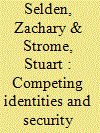

|
|
|
|
|
| Summary/Abstract |
The United States and India have forged a remarkably close security relationship since 2000, given the previous hostility of India to American foreign policy in general. Indian state identity until the mid-1990s was shaped by nonalignment and antipathy to the US-led liberal economic order. If identity is the source of interests, then how do states adopt policies that conflict with core elements of their identity when geopolitical shifts push states to adapt to a new regional balance of power? We argue that India did this by activating parts of the state identity that were compatible with American state identity and de-emphasizing those elements that were incompatible. But in doing so, Indian state identity changed, which impacts future foreign policy choices. This case illustrates the reciprocal relationship between security interests and state identity. We use content analysis of ten years of Indian media to demonstrate that the depiction of the US–Indian relationship increasingly focused on the democratic shared values of both states, despite beginning with an emphasis on military cooperation.
|
|
|
|
|
|
|
|
|
|
|
|
|
|
|
|
| 4 |
ID:
153545
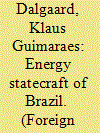

|
|
|
|
|
| Summary/Abstract |
This article evaluates the use of energy resources as instruments of foreign policy, herein termed “energy statecraft.” While most attention has been given to traditional energy resources such as oil and natural gas, few studies concern themselves exclusively with energy statecraft using renewable energy. The Brazilian case is unique because it is the only country to pursue energy statecraft with biofuels, and it does so through soft power, by encouraging mostly African countries to emulate its experience with biofuels. To inform this analysis, this study draws on the “conditionalist” approach in the economic statecraft literature to create a theoretical framework. While this approach establishes the conditions under which economic instruments of foreign policy are likely to be effective, this article applies these conditions to energy resources as foreign policy instruments, focusing on biofuels. However, the efficacy of energy statecraft cannot be fully understood without considering both the international context in which it takes place and the domestic context of target states. This article concludes that a theory of energy statecraft must consider three main factors: the conditions in the sender state, the domestic contexts of target states, and the international energy context.
|
|
|
|
|
|
|
|
|
|
|
|
|
|
|
|
| 5 |
ID:
153550
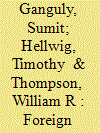

|
|
|
|
|
| Summary/Abstract |
Foreign policy belief systems have received much attention. Yet nearly all work examines attitudes in western democracies, chiefly the United States. The current security environment requires that we ask whether the foreign policy views of individuals in other nations—particularly regional powers—are similar in structure to those found in the US case. This article does so for the Indian case. Drawing on studies of US opinion, we develop a set of claims and test them on an original data set on Indian elites. We make four contributions. First, we show that Wittkopf’s framework applies to the Indian case. Second, we demonstrate how this framework can be made more generally applicable by revising its emphases on different types of internationalism and on rethinking the meaning of isolationist preferences. Third, we place the Indian case in comparative perspective. And last, we model the dimensions of Indian attitudes as a function of domestic ideology. Results of our analyses provide insights into the structure of foreign policy belief systems outside the Global North.
|
|
|
|
|
|
|
|
|
|
|
|
|
|
|
|
| 6 |
ID:
153552
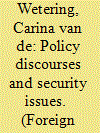

|
|
|
|
|
| Summary/Abstract |
This article explores how changing US security policies toward India were enabled by policy discourses. Since the second Clinton administration, the United States has shown a continuous interest in India. In order to analyze this, the article makes use of a critical constructivist approach in which phenomena are seen as socially constructed. It reveals how meanings are produced and attached to objects such as the United States and India within policy discourses. In policy discourses, security policies are not merely solutions to security issues: Policy discourses help to construct how security problems, objects, and subjects should be understood, and they simultaneously articulate security policies to solve the issues. These policy discourses enable and constrain foreign policy options available to foreign policy-makers. This article demonstrates that in 1997, India’s subject-position transformed, which made possible future policy changes in US foreign policy toward India.
|
|
|
|
|
|
|
|
|
|
|
|
|
|
|
|
| 7 |
ID:
153543
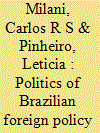

|
|
|
|
|
| Summary/Abstract |
Starting from the perspective that foreign policy is a public policy, this article discusses the conceptual and political implications of the new configuration of Brazilian foreign policy. Therefore, we abandon its automatic association with the cruder versions of realism and bring it to the field of politics, thus recognizing that its formulation and implementation fall into the dynamics of governmental choices which, in turn, stem from negotiations within coalitions, bargaining, disputes, and agreements between representatives of diverse interests. As a result, we remove foreign policy from a condition linked to inertial and supposedly self-evident and/or permanent national interests (which would be protected from injunctions of cyclical nature related to partisan politics) and undress it of features generally attributed to so-called state policies. Finally, we suggest ways for an innovative research agenda on the role of diplomatic agency, political institutions, and nonstate actors in Brazil’s foreign policy.
|
|
|
|
|
|
|
|
|
|
|
|
|
|
|
|
| 8 |
ID:
153542
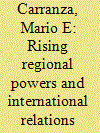

|
|
|
|
|
| Summary/Abstract |
This article explores Brazil and India's alternative paths in their search for great-power status. It examines the competing expectations of alternative IR theories regarding the conditions for great-power status in the post-Cold War era and their limited explanatory and predictive power. Although constructivism offers a more sophisticated approach, one also needs insights from realism/neorealism, neoliberal institutionalism, and globalization theory to understand the possibilities and limitations of the Brazilian and Indian strategies to be admitted to the great-power club. The article compares Brazil and India's foreign policies and nuclear diplomacy and challenges the idea that India's status as a nuclear weapon state enhances its prospects for joining the great-power club. Brazil does not possess nuclear weapons, but it has successfully created a consensual hegemonic regime in South America, which allows it to use a regionalist project (Mercosur, UNASUR) as a launching pad to gain admission to the great-power club. In contrast, despite possessing nuclear weapons, India has been unable to establish a consensual hegemonic regime in South Asia, and its “Pakistan problem” holds back her prospects for joining the great-power club. The article argues that a US blessing may not help India to gain entrance to the “board of the world” if other board members, such as China, resist India's admission. The conclusion examines the implications for IR theory of Brazil and India's alternative pathways to great-power status, and the impact of progress—or lack of progress—in global nuclear disarmament negotiations on both countries' possible admission to the great-power club.
|
|
|
|
|
|
|
|
|
|
|
|
|
|
|
|
| 9 |
ID:
153553
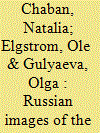

|
|
|
|
|
| Summary/Abstract |
This article probes into scope conditions for image change, investigating what changes in Russian images of the European Union (EU) have taken place as a result of the Russian–Ukrainian crisis. The crisis, a catalytic event, has been surrounded by uncertainty and strong emotions and is seen as a potential historical watershed in EU–Russian relations. The article examines Russia’s images of the EU’s intentions (good or bad?), capabilities (strong or weak?), and cultural and political status (inferior or superior?); and how they change in connection with the Russian–Ukrainian crisis. The article compares EU images across time found in Russian major newspapers and public opinion (studies undertaken in 2011–12 and 2015, before and after the crisis).
|
|
|
|
|
|
|
|
|
|
|
|
|
|
|
|
| 10 |
ID:
153547


|
|
|
|
|
| Summary/Abstract |
This article extends the role theory literature on domestic role contestation process by specifically examining bureaucracies as potential advocates of competing national role conceptions. While recent scholarship on domestic role contestation affirms the influence of party politics and cabinet dynamics on role enactment, bureaucracies remain underexplored as key actors despite the presence of a robust literature that supports their relevance in the foreign policymaking process. This article draws on expectations from both the role theory and bureaucratic politics literatures to explain how bureaucracies contest national roles and how such contestation may be resolved. The article tests these propositions through the study of China’s inter-bureaucratic contestation over its appropriate role in the South China Sea territorial disputes between 1979 and 1992. The article concurrently advances role studies on China by integrating them with more recent arguments about domestic role contestation. Traditionally, role theorists interested in China have either black-boxed the state or only focused on elite-mass role contestation, while this article explores intra-elite role contestation.
|
|
|
|
|
|
|
|
|
|
|
|
|
|
|
|
| 11 |
ID:
153554


|
|
|
|
|
| Summary/Abstract |
While the efforts of great powers to export their regimes to small states is well studied in the literature, the role of mass opinion in small states where great powers compete for influence remains under-theorized as a factor that can shape small state preferences over foreign alliances and policies. This paper investigates the causes of individual-level variation in foreign policy preferences toward major powers in small states with big neighbors. Using recent public opinion data from Georgia, we propose a conceptual framework based on three factors—political paternalism, economic status, and religiosity—to explain why some individuals in small states prefer closer ties with different major powers. We find support for all three factors influencing foreign policy attitudes toward Russia, but not America. As great powers continue to pursue policies that encourage their preferred political orders in small states, the analysis of foreign policy preferences in such states will become increasingly vital to our understanding of world politics.
|
|
|
|
|
|
|
|
|
|
|
|
|
|
|
|
| 12 |
ID:
153549


|
|
|
|
|
| Summary/Abstract |
This research provides the first empirical study examining the actual role that the Chinese Righteous War Tradition (CRWT) played in Chinese decisions for external war between 1950 and 1979. It aims to answer particularly whether the consideration of righteous war was treated as the decisive influence or simply as an instrument for legitimating such a decision. This research traces the role that the CRWT played in successive Chinese leaders' decision in three cases—the Korean War, the Sino-Indian War, and the Sino-Vietnamese War. The findings indicate that the ideas of the CRWT were largely used to assess and legitimate the decision for external war. However, the assessment of righteous causes generally occupied a lower priority and did not play the decisive role in determining the decision for external war. The actual role of the CRWT may largely be an instrument to help the Chinese to find legitimacy, and the legitimacy may have the potential to assist the Chinese to choose what should be done from among the options based on different pragmatic calculations.
|
|
|
|
|
|
|
|
|
|
|
|
|
|
|
|
| 13 |
ID:
153548


|
|
|
|
|
| Summary/Abstract |
Despite the axiom that actions speak louder than words, we care just as much about the latter as we do the former. Apparently, it matters whether we opt for “Burma” or “Myanmar,” “Republic of Macedonia” or “Former Yugoslav Republic of Macedonia” (FYROM), and even whether a consultative mechanism is called a Strategic Economic Dialogue or a Strategic and Economic Dialogue.2 Similarly, it matters what labels or nomenclature states adopt for each other: rivals, allies, or friends. One specific debate that has attracted a fair amount of attention is the language of strategic partners—what they mean (if anything) and with whom the relations have been forged. Yet, there is no definitive answer about how we should interpret the lexicography of strategic partnerships; a statement that...
|
|
|
|
|
|
|
|
|
|
|
|
|
|
|
|
|
|
|
|
|